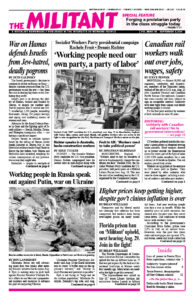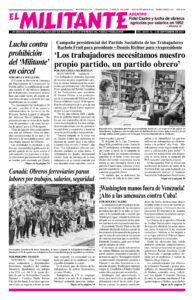MANCHESTER, England — Rachele Fruit, the Socialist Workers Party candidate for U.S. president, met with rail workers fighting to win recognition for the Rail, Maritime and Transport Workers union here Aug. 19.
Israel Akanji and Festus Igho are gateline workers who scan tickets for Carlisle Support Services, a contractor that refuses to recognize the union. Some 150 gateline workers have joined one-day strikes in recent months. Pete Clifford, a train dispatcher, RMT member and a leader of the Communist League, joined the discussion.
Akanji asked Fruit “to explain the Militant and its connection to your campaign.”
“The Militant builds solidarity with workers’ struggles like yours,” Fruit said. “For decades the unions were driven back, but today workers are fighting for higher wages and better working conditions,” pointing to strikes planned by machinists at Boeing in the U.S. and freight rail workers across Canada.
Central to the SWP’s campaign is the idea that “workers need to build a party of labor that will take on the social crisis we face,” she said.
“Unity is what we concentrate on to steel the workers,” Akanji said. “The bosses threaten the most vulnerable workers to try to make them give up. We talk one-on-one and let them know they have a right to join the union. We’re making progress every day. But how can we translate the union struggle to the political struggles you raise?”
“Once workers engage in a struggle, they start to see they need a better political instrument to fight for all our needs,” Fruit said, “to fight against unemployment, for higher wages, decent housing and health care. A party of labor would organize union and nonunion workers, small farmers, fishermen and truck drivers.
“We are talking about a party of millions,” she said. “To transform society it’s going to take a revolution. We start with what we are for — the kind of society that human beings need. We point to the example of the Cuban Revolution where workers and peasants overturned the U.S.-backed capitalist government and put working people in power.”
“But how do we encourage workers who want a part of the profits and a future for themselves to connect to these politics?” Akanji asked.
“It starts with workers beginning to struggle where they are up against the bosses and the government,” Fruit said. “This opens workers’ minds to want to learn how to fight better. The SWP gets out books that teach the history of the working class and lessons from successful revolutions.” She pointed to books by Thomas Sankara, the central leader of the 1983-87 revolution in Burkina Faso.
“Thomas Sankara, he is my hero!” Igho said. “But we can’t bring him back.”
“We’re keeping Sankara’s ideas alive,” Clifford said. Igho asked Clifford to bring him the titles at work after payday.
The discussion turned to the recent rioting here after three young girls were murdered in Southport near Liverpool. Igho said the government had done nothing to counter lies falsely accusing an immigrant of carrying out the killings.
“The rulers use every possible division against working people,” Clifford noted. “This is why we have to build a movement to focus on the real enemy, the capitalist ruling class. When workers are on the move it shatters these divisions.”
“I see that you always bring everything back to the workers!” Akanji said.
“Yes,” Clifford replied, “Only the working class has an interest in and the ability to make a revolution.”
“I’ve learned a lot today,” Akanji said. “Not everyone in the union struggle will agree with all these ideas, but I know many who want to learn more.”

